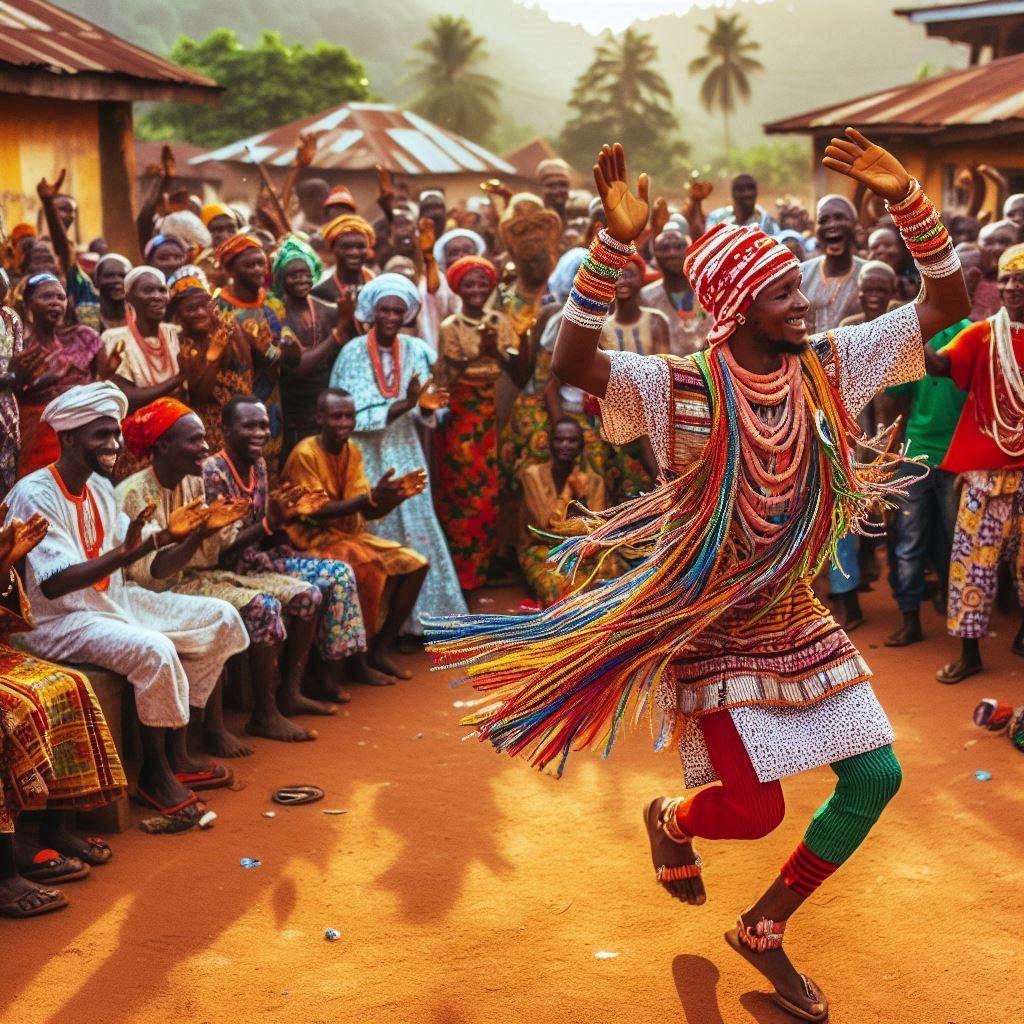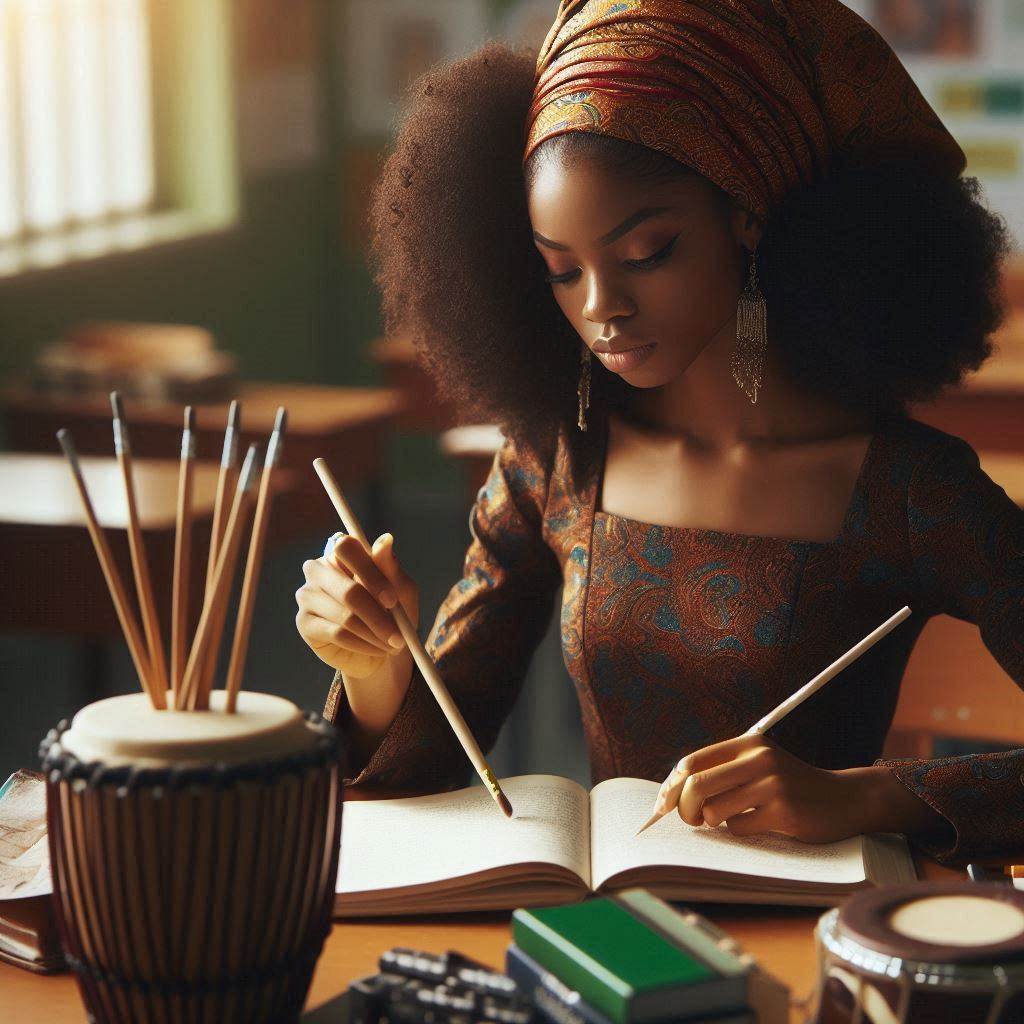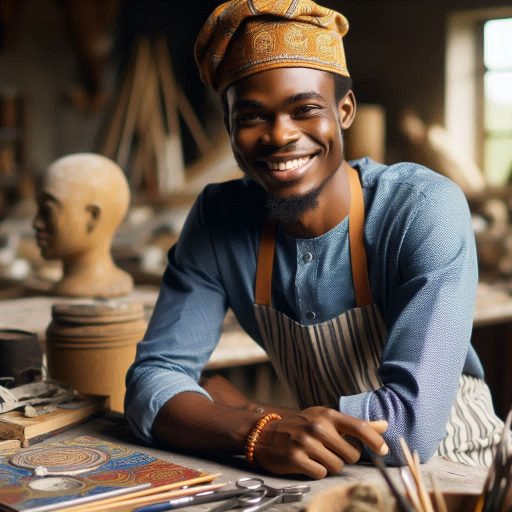Introduction
Nigerian music stands as a significant aspect of the country’s cultural heritage. It reflects the diversity of its people. Each region and ethnic group contributes uniquely to Nigeria’s rich musical tapestry.
The vibrant beats and rhythms tell stories of history, identity, and tradition. Let’s delve into the captivating world of Nigerian music.
A Rich Cultural Heritage
Nigeria’s music is a rich blend of indigenous and modern influences. Traditional instruments like the talking drum, shekere, and udu create unique sounds.
These instruments have been used for centuries, passed down through generations. They provide a connection to the past and a sense of identity.
Modern Nigerian music incorporates elements from various global genres, creating a dynamic and evolving soundscape.
Diversity Across Regions
Nigerian music is incredibly diverse, reflecting the country’s vast ethnic and cultural landscape. Each region boasts its unique musical styles and traditions.
For instance, the Yoruba people are known for their complex drumming patterns and rhythmic chants. The Igbo community celebrates with lively highlife music, characterized by its upbeat tempo and brass instruments.
The Hausa people contribute with their melodious traditional songs, often accompanied by the kora and kakaki.
Influences of Ethnic Groups
Ethnic groups in Nigeria have distinct musical styles that contribute to the country’s musical richness. The Fulani, known for their nomadic lifestyle, use the flute and drums to create enchanting melodies.
The Tiv people, with their unique kwagh-hir dance, showcase their vibrant culture through music. The Ijaw people, living in the Niger Delta, use the Owigiri and Agidigbo music styles to tell stories of their environment and experiences.
Evolution of Nigerian Music
Over time, Nigerian music has evolved, blending traditional and contemporary elements. Highlife music, popular in the mid-20th century, laid the foundation for modern Afrobeat.
Afrobeat, pioneered by Fela Kuti, combines jazz, funk, and traditional rhythms. Today, Nigerian artists like Burna Boy, Wizkid, and Tiwa Savage continue to innovate, gaining international acclaim.
Modern Nigerian Music
Modern Nigerian music is a vibrant fusion of styles and genres. Afrobeats, a contemporary genre, has taken the world by storm. It incorporates elements of hip-hop, reggae, and dancehall, creating a unique and infectious sound.
Nigerian artists are at the forefront of this movement, bringing global attention to their music and culture.
In essence, Nigerian music is a testament to the country’s rich cultural heritage and diversity. From traditional rhythms to modern beats, it tells the story of a nation.
Each region and ethnic group contributes uniquely, making Nigerian music a fascinating and dynamic art form. The evolution of Nigerian music showcases the creativity and resilience of its people.
It continues to captivate audiences worldwide, celebrating Nigeria’s vibrant culture and heritage.
Historical Background
Roots in Traditional African Music
Nigerian music has deep roots in traditional African music. It is rich in cultural diversity and history. Various ethnic groups contribute to the uniqueness of Nigerian music.
The Yoruba, Igbo, and Hausa people all have distinct musical styles. Traditional instruments like drums, flutes, and stringed instruments are central.
Music in Nigeria is more than entertainment; it is a vital cultural expression. It plays a crucial role in ceremonies, storytelling, and community bonding.
Traditional music often accompanies dances, rituals, and festivals. Drumming, in particular, is a significant aspect of Nigerian music. It communicates messages and rhythms that are unique to each ethnic group.
Nigerian traditional music also features call-and-response singing. This style fosters interaction and community participation. Folk songs often carry moral lessons, historical narratives, and spiritual messages.
These elements have been passed down through generations.
Influence of Colonialism on Nigerian Music
Colonialism had a profound impact on Nigerian music. British colonizers introduced Western musical instruments and styles. The fusion of traditional and Western music began during this period.
Churches and schools introduced Western hymns and classical music. Nigerian musicians adapted these influences into their music. Highlife music emerged as a popular genre in the 20th century.
It blended traditional rhythms with Western instruments like guitars and trumpets. Highlife became a symbol of modernity and social change. Nigerian musicians used this genre to express their experiences under colonial rule.
Independence movements also found a voice in highlife music. The music reflected the struggles and aspirations of the Nigerian people.
Globalization and Its Impact
Globalization further transformed Nigerian music. The advent of radio and television brought international music to Nigeria. Nigerian musicians started incorporating global influences into their music.
Genres like jazz, reggae, and hip-hop made their way into Nigerian music. Afrobeat emerged in the 1960s, pioneered by Fela Kuti. Afrobeat combined traditional African music with jazz, funk, and highlife.
It became a global phenomenon, spreading Nigerian music worldwide. Nigerian musicians began collaborating with international artists. This cross-cultural exchange enriched Nigerian music even more.
Nigerian music videos and songs gained popularity on global platforms.
The internet has played a crucial role in this globalization. Streaming services and social media platforms have made Nigerian music accessible worldwide.
Preservation and Evolution
Despite global influences, Nigerian musicians strive to preserve their cultural heritage. They blend traditional elements with modern genres, creating unique sounds.
Contemporary artists like Burna Boy and Wizkid draw from traditional rhythms. They have brought Nigerian music to a global audience, winning international awards.
Nigerian music continues to evolve, reflecting its rich heritage and modern influences. The fusion of old and new keeps the music vibrant and relevant.
Nigerian music is a testament to the country’s dynamic cultural history. It embodies the resilience and creativity of its people.
In short, Nigerian music is a rich tapestry of traditional and modern influences. It reflects the country’s historical journey and cultural diversity.
From its roots in traditional African music to its global impact, Nigerian music remains a vital cultural heritage.
Read: Impact of Christian Religious Studies on Nigerian Society
Traditional Nigerian Music
Nigeria has a rich cultural heritage that is reflected in its traditional music genres. These genres not only entertain but also have significant cultural importance in Nigerian society.
Juju Music
One of the most popular traditional music genres in Nigeria is Juju music.
Originating from the Yoruba people, Juju music is characterized by complex percussion rhythms, call-and-response vocal patterns, and the extensive use of traditional Yoruba instruments like the talking drum.
Juju music is not just a form of entertainment; it also serves as a means of communication and storytelling in Yoruba culture.
Through its lyrics and melodies, Juju music conveys important messages about history, culture, and social issues, making it a vital part of the cultural fabric of Nigeria.
Highlife Music
Highlife music is another traditional music genre that has deep roots in Nigerian culture.
Originating in Ghana but popularized in Nigeria, Highlife music combines elements of traditional African rhythms with Western musical instruments like the guitar and trumpet.
Highlife music is known for its upbeat tempo, lively melodies, and lyrics that often touch on themes of love, joy, and community.
In Nigerian society, Highlife music is a celebratory genre that is played at weddings, parties, and other social gatherings, bringing people together in a spirit of unity and festivity.
Fuji Music
Fuji music is a traditional Nigerian music genre that originated in the Yoruba culture of southwestern Nigeria.
Characterized by its fast tempo, energetic drumming, and powerful vocal performances, Fuji music is a dynamic and vibrant genre that captivates audiences with its rhythm and passion.
Fuji music serves as a form of cultural expression and identity for the Yoruba people, conveying their values, beliefs, and experiences through its lyrics and melodies.
It is often performed at important cultural events and celebrations, highlighting its significance as a cultural heritage of Nigeria.
Afrobeat Music
Afrobeat music is a modern fusion of traditional Nigerian music styles with elements of jazz, funk, and highlife.
Popularized by Nigerian music legend Fela Kuti, Afrobeat is known for its politically charged lyrics, complex rhythms, and infectious grooves that get people dancing.
Afrobeat music is not just a genre of music; it is a cultural movement that has influenced art, fashion, and politics in Nigeria and beyond.
Through its bold messages and dynamic sound, Afrobeat music continues to be a powerful force for social change and cultural expression in Nigerian society.
In fact, traditional Nigerian music genres like Juju, Highlife, Fuji, and Afrobeat play a vital role in preserving and celebrating the cultural heritage of Nigeria.
These genres not only entertain but also educate, inspire, and unite people, making them an essential part of the rich tapestry of Nigerian society.
Read: Understanding Mental Health Laws in Nigeria
Evolution of Nigerian Music
Nigerian music has undergone a remarkable evolution over the years. It has transformed from traditional rhythms to contemporary styles that captivate global audiences.
This journey reflects Nigeria’s dynamic cultural heritage and the adaptability of its musical traditions.
Traditional Roots
Traditional Nigerian music is deeply rooted in the country’s diverse ethnic cultures. Each ethnic group in Nigeria has its own unique musical traditions.
The Yoruba, Igbo, and Hausa-Fulani tribes, among others, have contributed significantly to Nigeria’s musical landscape. Traditional music often incorporates drums, flutes, and string instruments.
These instruments create rhythmic and melodic patterns that are both intricate and compelling.
Highlife and Juju
In the early 20th century, Nigerian music began to absorb external influences. Highlife music emerged, blending traditional African rhythms with Western instruments.
This genre became popular in the 1950s and 1960s. Pioneers like E.T. Mensah and Victor Olaiya spearheaded this movement. Juju music, led by icons like King Sunny Adé, also gained prominence during this period.
Juju fused traditional Yoruba music with electric guitars and modern production techniques.
Afrobeat Revolution
The late 1960s and 1970s marked a revolutionary phase for Nigerian music. Fela Kuti created Afrobeat, combining highlife, jazz, and funk with traditional African rhythms.
Afrobeat’s political lyrics and complex rhythms resonated worldwide. Fela’s influence extended beyond music, impacting social and political spheres. His legacy continues to inspire contemporary musicians globally.
Fusion with Modern Genres
In the late 20th century, Nigerian music began to fuse with modern genres like hip hop, R&B, and pop. This fusion created a vibrant and unique sound.
Artists like 2Baba (formerly 2Face Idibia) and P-Square blended African rhythms with modern beats. Their music gained international recognition, showcasing Nigeria’s musical innovation.
The Rise of Afrobeats
The 21st century has seen the rise of Afrobeats, a genre distinct from Fela Kuti’s Afrobeat. Afrobeats incorporates elements of dancehall, hip hop, and electronic music.
Nigerian artists like Wizkid, Davido, and Burna Boy have brought Afrobeats to global stages. Their success reflects the genre’s wide appeal and the power of Nigerian music on the world stage.
Global Influence and Collaboration
Nigerian music’s global influence continues to grow. International artists collaborate with Nigerian musicians, creating cross-cultural musical experiences.
Beyonce’s collaboration with Nigerian artists on her “Lion King: The Gift” album is a notable example. Such collaborations highlight the global appeal and versatility of Nigerian music.
Basically, The evolution of Nigerian music showcases the rich cultural heritage and adaptability of its traditions. From traditional roots to contemporary fusion, Nigerian music continues to evolve and inspire.
It bridges cultural divides and unites people through its compelling rhythms and melodies. The future of Nigerian music looks promising, with its influence only set to expand further.
Read: How Nigerian Schools Address Student Psychology

Impact of Nigerian Music
Global Influence
Nigerian music has significantly impacted the global music scene. Artists like Fela Kuti pioneered Afrobeat, blending traditional African rhythms with jazz and funk.
This innovative genre gained international recognition and influenced musicians worldwide. Burna Boy, a contemporary star, has brought Afro-fusion to a global audience.
His music incorporates Afrobeat, reggae, dancehall, and pop, resonating with diverse listeners. Winning a Grammy in 2021 solidified his status as a global icon.
Other artists like Wizkid and Davido have also achieved international success, collaborating with major global artists.
Cultural Pride
Nigerian music is a source of pride for Nigerians. It reflects the country’s rich cultural heritage and diverse traditions. The music celebrates Nigerian languages, stories, and lifestyles, fostering a sense of unity and identity.
Songs often address social and political issues, giving voice to the people’s struggles and aspirations. This connection to the audience strengthens national pride and solidarity.
The success of Nigerian artists abroad also enhances national pride, showcasing Nigeria’s cultural richness on a global stage.
Identity and Connection
Nigerian music helps Nigerians connect with their roots. For the diaspora, it provides a sense of belonging and cultural continuity.
Listening to Nigerian music evokes memories of home, bridging the gap between distant lands and homeland.
It also introduces younger generations to their cultural heritage, ensuring its preservation and continuity.
Through music, Nigerians everywhere can celebrate and maintain their cultural identity, regardless of their physical location.
Economic Impact
The global success of Nigerian music has economic benefits. It creates job opportunities within Nigeria’s entertainment industry.
From musicians to producers, dancers, and sound engineers, many benefit from this thriving sector. International collaborations and tours also boost the economy.
Moreover, it attracts global investment and tourism, further strengthening Nigeria’s economic position. Nigerian music festivals draw international audiences, promoting cultural exchange and economic growth.
Social Influence
Nigerian music promotes social change and awareness. Artists often use their platforms to address important social issues. Fela Kuti was known for his activism against corruption and oppression.
Contemporary artists continue this legacy, highlighting issues like police brutality, gender equality, and poverty.
Their music inspires and mobilizes listeners, fostering social consciousness and change.
Nigerian music, therefore, serves as both entertainment and a powerful tool for social advocacy.
Generally, Nigerian music’s influence extends far beyond entertainment. It shapes global music trends, fosters cultural pride, and strengthens national identity.
Its economic impact supports countless livelihoods, while its social influence drives important conversations and change.
From Fela Kuti to Burna Boy, Nigerian artists continue to leave an indelible mark on the world.
Their music not only entertains but also educates, inspires, and unites people across the globe.
Nigerian music is indeed a vital cultural heritage, cherished both at home and abroad.
Read: Psychological Impact of COVID-19 on Nigerians
Transform Your Career with Expert Guidance
Get personalized mentorship consulting that’s tailored to your unique path. Our expert advice is actionable and exclusive.
Get StartedCultural Preservation
Importance of Preserving and Promoting Nigerian Music
Nigerian music is a vibrant reflection of the country’s rich cultural heritage. It tells stories, preserves traditions, and connects generations.
By preserving and promoting Nigerian music, we ensure that future generations understand their roots.
Music is a powerful tool for cultural continuity, fostering national pride and unity.
Traditional Nigerian music showcases diverse languages, rhythms, and instruments, offering a unique glimpse into the nation’s soul.
In today’s globalized world, traditional music faces the threat of extinction. Modern influences and technological advancements often overshadow indigenous sounds.
Therefore, it is crucial to actively preserve these musical traditions.
Without preservation efforts, we risk losing invaluable cultural expressions that have been passed down through generations.
Nigerian music not only entertains but also educates, making its preservation a matter of cultural significance.
Initiatives for Safeguarding Traditional Nigerian Music
Numerous initiatives and organizations are dedicated to preserving Nigerian music. They work tirelessly to safeguard traditional sounds and ensure their longevity.
The Musical Society of Nigeria (MUSON) is one such organization. It promotes classical and traditional Nigerian music through concerts, festivals, and educational programs.
MUSON’s efforts highlight the importance of maintaining musical traditions in a rapidly changing world.
Another key initiative is the Nigerian Television Authority (NTA). NTA airs programs showcasing traditional music and dance, reaching a wide audience.
These programs educate viewers about Nigeria’s rich musical heritage, fostering appreciation and understanding. NTA’s commitment to cultural programming plays a significant role in preserving traditional music.
The Center for Black and African Arts and Civilization (CBAAC) also contributes to cultural preservation.
CBAAC organizes workshops, exhibitions, and performances that celebrate Nigerian music.
By engaging the public, CBAAC ensures that traditional music remains vibrant and relevant.
Their initiatives provide a platform for artists to share their craft and inspire future generations.
Community Efforts and Grassroots Movements
Local communities play a crucial role in preserving traditional music. Grassroots movements and cultural festivals celebrate indigenous sounds and promote cultural pride.
Festivals like the Osun-Osogbo and Eyo Festival feature traditional music, dance, and rituals. These events bring communities together, fostering a sense of belonging and continuity.
Community efforts are vital in passing down musical traditions from one generation to the next.
Role of Education and Technology
Educational institutions are increasingly incorporating traditional music into their curricula. Schools and universities offer courses on Nigerian music, teaching students about its history and significance.
By integrating traditional music into education, we ensure its preservation for future generations.
Technology also plays a role in preservation efforts. Digital archives and online platforms provide access to traditional music, reaching a global audience.
Preserving and promoting Nigerian music is essential for maintaining cultural heritage. Through the efforts of organizations, community initiatives, and educational programs, traditional music continues to thrive.
By valuing and safeguarding our musical traditions, we honor the past and inspire future generations. Nigerian music is a treasure that must be preserved, celebrated, and passed on.
Conclusion
The Significance of Nigerian Music as a Cultural Heritage
Nigerian music embodies the nation’s vibrant cultural heritage. It represents the diversity of its people and their rich traditions.
Nigerian music is a testament to the country’s historical experiences and societal evolution. Through its rhythms and melodies, it tells stories of joy, struggle, love, and resilience.
This music serves as a unifying force, bringing together diverse ethnic groups under a shared cultural identity. It bridges generational gaps, allowing the young to connect with their heritage.
Moreover, Nigerian music has influenced global sounds, showcasing its importance on an international stage.
Celebrating the Richness of Nigerian Music
Nigerian music is more than just entertainment; it is an essential part of the nation’s cultural fabric. The richness of its genres, from traditional folk songs to contemporary Afrobeat, highlights its dynamic nature.
Artists like Fela Kuti and Burna Boy have popularized Nigerian sounds worldwide, gaining international acclaim. The fusion of traditional instruments with modern beats creates a unique auditory experience.
This music reflects the creativity and innovation of Nigerian artists. Each song and genre offers a glimpse into the country’s diverse cultural landscapes.
Encouragement to Explore Nigerian Music
Exploring Nigerian music can deepen one’s appreciation for its cultural significance. Listen to the beats of Afrobeat, feel the energy of Afropop, and enjoy the soulful sounds of Juju.
Discover the rhythmic patterns of Fuji and the storytelling in Highlife music. Each genre reveals different aspects of Nigerian life and traditions.
Attend live performances or listen to recordings to experience the vibrancy of these sounds. Understanding the stories behind the music enriches the listening experience.
Nigerian Music’s Contribution to Cultural Identity
Nigerian music is a cornerstone of the nation’s cultural identity. It reflects the nation’s history, struggles, and triumphs. Music festivals and events celebrate this heritage, attracting audiences from around the world.
These gatherings showcase the diversity and unity of Nigerian culture. The global success of Nigerian artists highlights the country’s cultural export power.
Nigerian music videos and performances are rich in cultural symbols and traditional attire. This visibility promotes Nigeria’s cultural heritage on a global platform.
In general, Nigerian music is an invaluable cultural heritage. It captures the essence of the nation’s identity and tells its stories to the world.
Nigerian music is not just an art form but a powerful cultural expression. It connects people across generations and ethnicities, fostering unity and pride.
Exploring this music offers a deeper understanding of Nigeria’s cultural richness.
By appreciating Nigerian music, one can gain insight into the soul of the nation. Let us celebrate and preserve this vibrant cultural legacy for future generations.




